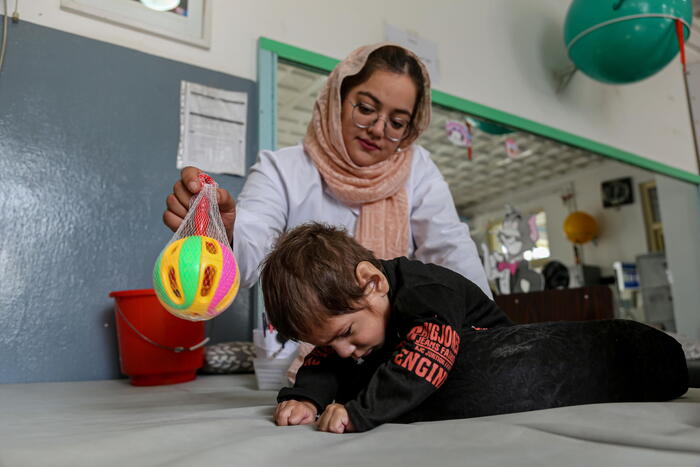One afternoon in 2016, when Saida was finishing her afternoon prayers, she heard her husband's voice asking her to come down to the street.
To her surprise, he was not alone.
She was waiting for her along with two other men who, after receiving her husband's order, sprayed her with acid, destroying her clothes and melting the skin on her body.
It was no use that the woman stayed for almost four months in a hospital receiving surgeries and treatments.
After the attack, he lost both his ear and his left eye, leaving his life, as he knew it, forever behind.
Saida, 28, is one of 29 women who appear in a report published on October 28 by Human Rights Watch (HRW) accusing the country's government of not offering sufficient support or resources to stop the growing violence against women. women.
More information
Women and girls in Kenya doubly hit by COVID-19
Inequality pandemic
Gender violence in times of coronavirus
Acid attacks are a particularly extreme form of violence in a pattern of widespread gender-based violence directed at women and girls in Bangladesh.
The published text shows that many are suffering sexist attacks, including beatings and other physical attacks, verbal and emotional abuse and financial control, for months or even years before an acid attack, with little help.
In Saida's case, during the 12 years she was married before the attack, her husband regularly beat her and poured chemicals into her eyes three times, temporarily rendering her visionless each time.
In one of the interviews, she mentioned that her spouse was "trying to kill her."
As has happened in other parts of the world, violence against women and girls has increased further with the arrival of the coronavirus pandemic.
The human rights and legal services program of BRAC, a leading non-governmental organization in Bangladesh, has documented an increase of almost 70% in reported incidents in March and April 2020, compared to the same period last year.
Incidents reported in March and April 2020 have increased by almost 70% compared to the same period last year
HRW denounces that as this violence grew, access to legal remedies and urgent protection measures was interrupted, highlighting the flaws in a system that was already failing.
As Meenakshi Ganguly, HRW's South Asia Director, explains to Future Planet, a prominent women's rights activist commented during one of the interviews that many Bangladeshis "still believe that domestic violence is foolish violence."
Ganguly says that daily abuse “is so normalized that many women and girls in Bangladesh do not expect to be taken seriously if they complain, or do not even know that they have the right to file a complaint, to seek redress.
So, of course, they must overcome immense obstacles just to denounce the violence and seek safety. "
The lockdown in Bangladesh lasted from March 26 to May 31.
During this time, Ganguly notes that instead of extending additional services to women and girls facing an increase in domestic violence, what the government did was restrict critical services.
Court services for victims of gender-based violence were temporarily closed.
Some government shelters stopped taking survivors.
NGOs reported an increase in calls from women saying they faced violence in the home, but literally had nowhere to go.
"These fissures in the system, exacerbated by the government's response with the arrival of the COVID-19 pandemic, should serve as a red flag that urgent systemic reform is needed," he argues.
The women interviewed by HRW live in six of Bangladesh's eight divisions.
All of them are survivors of gender-based violence, including acid attacks.
The report notes that the government has made tackling this type of attack a priority, but even survivors of these cases find it difficult to receive protection and legal remedies.
The investigators also reviewed case files and interviewed human rights activists, lawyers, and academics working on gender-based violence issues.
According to a survey by the Bangladesh Bureau of Statistics from 2015, more than 70% of married women or girls had faced some form of abuse by their partner.
Half of the women interviewed responded that they had been physically assaulted, but they had not told anyone.
Less than 3% of them had taken legal action.
Data from the Bangladeshi human rights group Ain or Salish Kendra (ASK) is also very worrying: it shows that at least 235 women were killed by their husband or family in the first nine months of 2020 alone.
According to another prominent human rights group in the country, Odhikar, more than 3,300 women and girls were killed in dowry disputes between January 2001 and December 2019. These figures are possibly only a fraction of the actual cases that do and do not happen. are picked up in the media.
This 2020 marks the anniversary of two historical laws on gender-based violence in Bangladesh: the Law on Prevention of the Repression of Women and Children, 2000, and the Law on Domestic Violence, 2010. The conclusions drawn from the investigation of HRW reflects that despite their existence, women and girls are often unable to seek meaningful legal remedy and perpetrators of violence are rarely held accountable.
With no witness protection law or program in place, witnesses and victims drop cases due to threats and fear for their lives.
Saida shared with investigators that she never felt safe reporting her husband for fear that the police would not help her.
When her husband attacked her with acid, she says the authorities acted in disbelief.
Even after losing his eye and ear, the officer in charge of his case told him, "I don't think he did it, so we're going to let him go."
Ganguly notes that police who are meant to offer the first line of protection sometimes even "humiliate the victim, require bribes to present a case, or refuse to present it entirely."
With limited access to a safe haven, many women find it too dangerous to risk filing a report with the police, who could ignore it, leaving her open to potential retaliation from her husband or another family member who is harming her.
“If a case is filed, it often goes on for years and the survivor must face repeated threats, demands for bribes and ongoing abuse.
Prosecutors are often not trained in criminal law and they don't make sure that witnesses are brought forward and that there is adequate evidence to carry a case forward, ”criticizes Ganguly.
At the same time, with no witness protection law or program in place, many of them, and the victims themselves, drop cases due to threats and fear for their lives.
In the end, even after all this, the probability of successfully obtaining legal recourse is around 1%, according to the Multisectoral Program on Violence against Women.
Protests broke out in Bangladesh in early October after a video of a group of men attacking, stripping and sexually assaulting a woman went viral online.
The protesters then called for the resignation of the Interior Minister, Asaduzzaman Khan Kamal, because in their opinion, the government is not addressing the alarming increase in sexual violence in the country.
FUTURE PLANET can follow on
,
and
, and subscribe
here
to our 'newsletter'
.

/cloudfront-eu-central-1.images.arcpublishing.com/prisa/G5ZTKCHUYZC6JOSDA3625MWWKU.jpg)
/cloudfront-eu-central-1.images.arcpublishing.com/prisa/L6TCOQ5HGZCWTOW6YNBMMGDKBA.jpg)
/cloudfront-eu-central-1.images.arcpublishing.com/prisa/43V2S254JJFBLF2IDRP744FBU4.jpg)


/cloudfront-eu-central-1.images.arcpublishing.com/prisa/EMYXC3EVHNEG3OJHGIQCB2IVYA.jpg)








